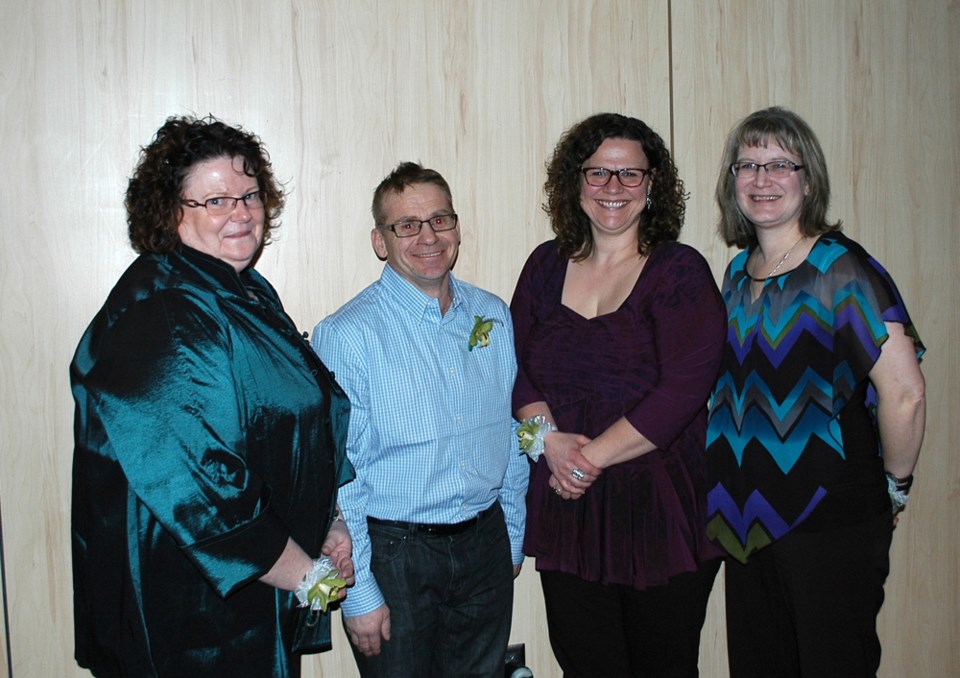The Saskatchewan Urban Municipalities Association (SUMA) held another convention on Feb. 4 in Saskatoon, during which resolutions were made and certain Humboldt individuals were recognized.
Four city employees were recognized at the event for their many years of service: Sandra Pauli, Cathy Wolfe, Jennifer Hoesgen, and Richard Ludwig. The Humboldt & District Gallery was also recognized for receiving second place for the municipal awards for the work done revitalizing the Merchants Bank of Canada into an art gallery.
Also of interest at the meeting were the issues of revenue sharing, the suspended Multi-Material Recycling Program (MMRP), and other community issues.
“There was question as to whether revenue sharing would continue given the financial state of the province,” said Mayor Malcolm Eaton. “When the premier spoke, he spoke directly to it and said they’re working hard to maintain the program, but couldn’t give us a definite answer.”
According to Eaton, Premier Brad Wall said that there is stress on the provincial budget and so everything is on the table. However, Eaton said they’re “optimistic that the government will be looking at the request we’ve made to maintain the program.” Unfortunately, no one will know until the provincial budget is released in March.
To recap, revenue sharing has become a predictable source of revenue for municipalities to rely on each year. The total amount is equal to approximately one per cent of the provincial sales tax revenues and is divided amongst the local governments. It is because this amount is proportionate to revenue that Eaton believes it is a sustainable model in spite of a tight provincial budget.
“We think the program works because it’s based on one per cent of PST and based on the economy,” said Eaton. “If the economy is slowing down, it provides for a reduction. We’re quite happy to take a reduction based on the formula. I don’t think the government should be making a decision to change the formula in the middle of the process. I hope the government will keep the promise they made a few years ago.”
The second major issue that was addressed was the MMRP. It was set to launch at the beginning of January, but was suspended due to some last minute changes. Many communities and REACT Waste Management were disappointed since they had planned this year’s budget with that additional revenue in mind. To suddenly be without it has left both the regional waste management organization and local governments scrambling. In addition to the revenue sharing situation, Humboldt and other cities will be left in a tight spot concerning this year’s budget.
“The province has indicated that they’re working on it with us, so we’re hoping MMRP be back on track by the end of the year,” said Eaton. “We have the lowest diversion rate of all the provinces. The goal is to get out of last place and into first place.”
Moreover, the loss of the program might further impact the city because the shortfall it causes with REACT could have a domino effect on the cities REACT serves. A deficit for them might mean an increase in costs for the cities they serve.
“The minister spoke about their efforts to get this thing back on track within the next six to 12 months, so let’s hope that happens,” said Eaton. “The MMRP is very complicated. There are a lot of industry partners, like plastics, cardboard, newspaper, packaging, etc. Different sized businesses will be impacted. Lot of diff partners that have to come together and agree. It doesn’t happen easily with one meeting, so hopefully it can get on track.”
To continue with their recycling diversion goals, the City of Humboldt has already started contemplating what it would take to get a door-to-door pickup program for recycle bins in place by next year. There’s no guarantee they can get a program like that up and running so soon, but there was mention of it at the Feb. 9 city council meeting.
Beyond those two major issues, there were also resolutions made asking the province to look at mandatory bicycle helmet laws. According to Eaton, the communities agreed that it would be better for the provincial government to spearhead that project as opposed to each community tackling it individually.
Then there was the motion for a resolution supporting the notion of a national inquiry or round table discussion on missing or murdered aboriginal women. The resolution was put forward and supported by North Battleford, but Eaton agreed that it was a serious issue across the country.
Then there were other resolutions such as an increase in compensation for fire departments when they’re called out to motor vehicle collisions outside the city. It would be funded by SGI and Eaton said the intent of the motion is to “increase those rates so they more accurately reflect the real costs when the department goes out to these calls.”
Last but not least was the resolution that there should be some compensation for communities that bear the costs of landing the STARS Air Ambulance helicopter.
“Difference communities can put forward different motions for the convention,” said Eaton. “I think a lot of the resolutions and the work of the convention is over the long term. It’s about working with the provincial government to make improvements to public policy, programs, and services like MMRP.”




